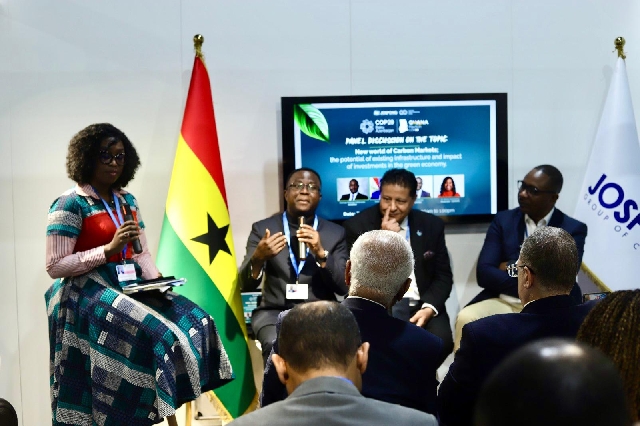COP29: JGC CIO advocates for capacity building in carbon financing
The Chief Investment Officer (CIO) of Jospong Group of Companies (JGC), Mr. Noah Gyimah, has underscored the importance of capacity building in carbon financing for developmental projects. Speaking at a side event during the 29th Conference of Parties (COP29) of the United Nations Framework Convention on Climate Change (UNFCCC) on November 14, 2024, he highlighted the critical role of enhancing skills and knowledge in both the private and public sectors to effectively tap into carbon financing opportunities.
During the panel discussion titled “New World of Carbon Markets: The Potential of Existing Infrastructure and Impact of Investments in the Green Economy,” Mr. Gyimah emphasized that developing these capacities is essential for identifying projects that can attract carbon financing. He cautioned, “Without this knowledge, we risk simply discussing climate change without understanding the steps needed to commercialize these activities and attract investment.”
COP29, which opened in Baku, Azerbaijan, on November 11, 2024, has been marked by a call for world leaders to set an ambitious global climate finance target. The two-week conference, running until November 22, 2024, is focusing on key themes including climate action, finance and investment, energy, and innovation.
Mr. Gyimah also shared Jospong Group’s success in securing $20 million in carbon financing from the Swiss government, with the support of the Ghanaian government. He explained that this achievement was made possible through the collaboration of scientists and sustainable finance experts who developed a financial model to quantify the impact of carbon remediation. “By calculating the CO2 emissions reduction and converting it into a financial model, we were able to demonstrate the value of these efforts,” he said.
He further stressed the need for capacity building in areas such as project finance, data collection, and technology integration. “For Ghana to attract more capital, it’s vital that we strengthen the capacities of people to understand project finance, documentation, and data management,” he explained.
Technology, particularly artificial intelligence (AI), also plays a key role in improving waste management, he added. “All of this is data-driven. To demonstrate the impact of carbon remediation, we need reliable data to prove our efforts,” he said, referring to the importance of accurate data collection in environmental initiatives.
Mr. Gyimah also addressed the issue of waste segregation, highlighting the importance of starting at the source with separate bins for different types of waste. He suggested policy initiatives, such as subsidizing bins or creating buyback programs, to encourage proper waste sorting.
Jospong Group’s innovative strategies in waste management, including waste segregation, recycling, organic fertilizer production, and transfer loading stations, were also highlighted as key to effective carbon reduction efforts. “By making these investments closer to communities, we’re able to aggregate waste and begin the treatment process before it reaches the recovery plant for recycling,” he explained.
In conclusion, Mr. Gyimah called for collective action among individuals, governments, and the private sector to reduce carbon emissions. “By building capacities and leveraging technology, we can unlock the necessary capital and pave the way for a sustainable future,” he said.





















































